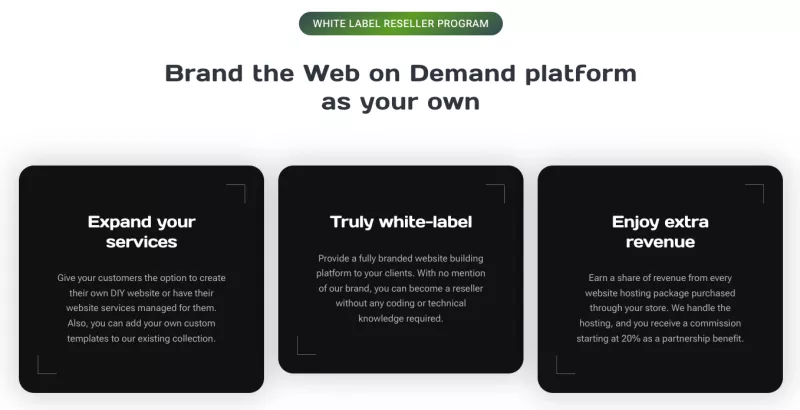Are you a non-technical user who wants to create a website but feels overwhelmed by the technical aspects of website development? Maybe you're a freelancer or an agency looking for a way to speed up and simplify your workflow. You've heard of white label website platforms, but you're not ready for changes until you see how a tool like this would benefit you. Don't worry, you're not alone. Many individuals, small businesses and agencies face this challenge. Fortunately, white label website platforms have emerged as a game-changer, simplifying website development even for non-technical users. In this blog post, we will explore what white label website platforms are, how they work, and the benefits they offer. We will also discuss real-world scenarios where white label website platforms have made a significant impact. So, let's dive in!
White label website platforms are powerful website building tools that allow non-technical users to create professional-looking websites without any coding knowledge. These platforms provide pre-designed templates, drag-and-drop editors, and an array of customization options, making the website development process accessible and user-friendly.
White label website platforms work on a simple principle: they provide a user-friendly interface that allows users to select templates, customize design elements, and add content without getting into the nitty-gritty of coding. Here's a step-by-step breakdown of how these platforms typically work:
Template Selection: Users can choose from a wide range of pre-designed templates for a website suitable for various industries and purposes. These templates are designed by professional web designers, ensuring a visually appealing starting point.
Customization Options: Once a template for a website is selected, users can customize various elements such as colors, fonts, layouts, and images. The drag-and-drop editor allows users to easily move around design elements and create a website that aligns with their unique brand identity.
Content Creation: Users can add and edit content using a user-friendly content management system. This includes creating pages, writing blog posts, adding images and videos, and integrating social media platforms.
Mobile Responsiveness: White label website platforms also prioritize mobile responsiveness, ensuring that websites look and function seamlessly across different devices. This is crucial in today's mobile-dominated world.
Domain and Hosting: Once the website is ready, users can select a domain name and choose a hosting provider directly from the platform. This streamlines the entire process, eliminating the need for users to engage with separate domain and hosting services.
SEO Optimization: White label website platforms often come with built-in SEO tools, allowing users to optimize their websites for better search engine rankings. This includes the ability to add meta tags, customize URLs, and optimize content for keywords.

Now that we understand how white label website platforms work, let's explore the benefits they offer to non-technical users. These benefits have contributed to the growing popularity of these platforms in recent years:
Ease of Use: White label website platforms are designed to be user-friendly, with intuitive interfaces that require no coding knowledge. This means that even individuals with limited technical skills can create professional-looking websites.
Time Efficiency: The drag-and-drop functionality and pre-designed templates significantly reduce the time required to create a website. Users can focus on customizing the design and adding content, rather than spending hours on coding and troubleshooting.
Cost-Effectiveness: Hiring a professional web developer can be expensive, especially for individuals and small businesses with limited budgets. White label website platforms offer affordable alternatives, eliminating the need for costly development services.
Design Flexibility: White label website platforms provide a wide range of templates and customization options, allowing users to create unique and visually appealing websites. This flexibility ensures that websites stand out from the crowd and reflect the user's brand identity.
Continuous Updates and Support: White label website platforms often come with regular updates and technical support, ensuring that users have access to the latest features and assistance when needed. This eliminates the need for users to keep up with ever-changing web development trends.

To better understand the impact of white label website platforms, let's explore a few real-world scenarios where these platforms have simplified website development for non-technical users:
Scenario 1: Small Business Owners
Imagine a small business owner who wants to create an online presence for their business but lacks the technical skills to do so. With a white label website platform, they can quickly set up a professional website by selecting a template, customizing the design, and adding content. This allows them to focus on their core business activities without the need to hire a web developer or spend months learning coding.
Scenario 2: Freelancers and Creatives
Freelancers and creatives often need an online portfolio to showcase their work and attract potential clients. White label website platforms provide them with an efficient way to create visually stunning websites. Being able to create more websites in less time gives you the opportunity to enrich your portfolio with which you will emphasize your skills and expertise on specific projects. With the ability to easily update and manage their portfolios, freelancers can focus on their creative work, knowing that their online presence is taken care of.
Scenario 3: Non-Profit Organizations
Non-profit organizations often operate on limited budgets, making it challenging to allocate funds for website development. White label website platforms offer a cost-effective solution that allows these organizations to create professional websites, raise awareness for their cause, and engage with supporters. The ease of use and design flexibility ensure that non-profit organizations can effectively communicate their message without breaking the bank.

White label website platforms have evolved over the years, driven by the increasing demand for user-friendly website development solutions. In the past, creating a website required extensive coding knowledge and specialized skills. This restricted website development to a niche group of professionals and limited the possibilities for non-technical users.
However, with the advent of white label website platforms, the landscape of website development has changed significantly. These platforms have democratized website creation, empowering non-technical users to take control of their online presence. This shift has led to a surge in the number of websites created by individuals and small businesses, contributing to the growth of the digital economy.
In recent years, there has been a strong emphasis on mobile responsiveness and user experience in website development. White label website platforms have adapted to these trends, ensuring that websites created on their platforms are optimized for mobile devices and offer seamless user experiences. This is crucial as mobile browsing continues to dominate internet usage globally.

Looking ahead, white label website platforms are likely to continue shaping the website development landscape. Here are a few potential future implications:
- Increased Customization Options: White label website platforms may offer even more customization options, allowing users to create truly unique websites that stand out from the crowd. This could include advanced design features, personalized animations, and interactive elements.
- Integration with Emerging Technologies: As new technologies emerge, white label website platforms may integrate them seamlessly into their offerings. This could include integrations with artificial intelligence, virtual reality, voice assistants, and more, enabling users to create cutting-edge websites without technical expertise.
- Expansion into E-commerce: Many white label website platforms have already started offering e-commerce capabilities, allowing users to set up online stores and sell products or services. This trend is likely to continue, making website platforms a one-stop solution for both informational and transactional websites.

White label website platforms have revolutionized website development for non-technical users, empowering them to create professional websites without coding knowledge. These platforms simplify the process through intuitive interfaces, pre-designed templates, and customization options. The benefits include ease of use, time efficiency, cost-effectiveness, and design flexibility. Real-world scenarios demonstrate how white label website platforms have made a significant impact in various contexts. As we navigate through the historical context, current trends, and potential future implications, it becomes evident that white label website platforms will continue to play a vital role in simplifying website development and driving the growth of the digital economy.

